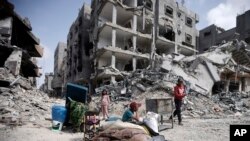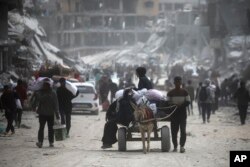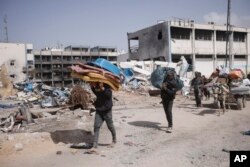The request is part of an ongoing case alleging that Israel’s military campaign in Gaza breaches the Genocide Convention. Israel strongly denies breaching the convention.
Citing “widespread starvation” in Gaza, South Africa on Wednesday urged the United Nations' top court to order Israel to allow humanitarian aid into the war-torn region, as part of an ongoing case alleging that Israel's military campaign in Gaza breaches the Genocide Convention. Israel strongly denies breaching the convention.
South Africa, which filed the genocide case late last year at the International Court of Justice, said it was compelled to seek more preliminary orders “in light of the new facts and changes in the situation in Gaza — particularly the situation of widespread starvation — brought about by the continuing egregious breaches” of the convention by Israel.
At hearings in January, lawyers for Israel argued that its war in Gaza was a legitimate defense of its people and that it was Hamas militants who were guilty of genocide. The Israeli foreign ministry had no immediate comment Wednesday night to South Africa's latest request.
While aid groups say all of Gaza is mired in a humanitarian crisis, the situation in the largely isolated north stands out. Many of the estimated 300,000 people still living there have been reduced to eating animal fodder to survive. The U.N. says that one in six children under the age of 2 in the north suffers from acute malnutrition.
“South Africa respectfully calls on this Court to act again now — before it is too late — to do what is within its power to save Palestinians in Gaza from genocidal starvation,” South Africa said in a written request.
The U.N.'s Office for the Coordination of Humanitarian Affairs said in a statement Wednesday that despite “facing extreme challenges," aid workers were able to significantly ramp up humanitarian efforts in February. It cited a 48% increase in humanitarian missions over the previous month.
But the office added that humanitarian efforts were "undermined by a cessation of operations to the north and an overall decline in the security of civilians, including humanitarian aid workers.”
South Africa also accused Israel of violating provisional measures imposed by the court on January 27, when judges ordered Israel to do all it could to prevent death, destruction and any acts of genocide in Gaza, but stopped short of ordering an end to the military offensive that has laid waste to the Palestinian enclave.
On Wednesday, South Africa urged the court to issue more orders, including that Israel immediately enable urgently needed services to address starvation and other issues. It called on judges to make orders without first holding a hearing, due to the “extreme urgency of the situation.”
The war began with a Hamas attack on southern Israel on October 7 in which Palestinian militants killed around 1,200 people and took about 250 hostages. More than 100 of them were released during a weeklong cease-fire in November.
The attack sparked an Israeli invasion of the enclave of 2.3 million people. Gaza’s Health Ministry said Wednesday the Palestinian death toll from the war climbed to 30,717. The ministry is part of the Hamas-run government and maintains detailed casualty records. It does not differentiate between civilians and combatants in its tallies but says women and children make up around two-thirds of those killed.
The toll has continued to climb since the Jan. 27 preliminary measures order issued by the U.N. court in The Hague.
South Africa also again urged the court to order that “All participants in the conflict must ensure that all fighting and hostilities come to an immediate halt, and that all hostages and detainees are released immediately.”
In an attempt to further ratchet up international pressure on Israel, South Africa also asked the court to order all countries that have ratified convention to “refrain from any action, and in particular any armed action or support thereof, which might prejudice the right of the Palestinians in Gaza to be protected from acts of genocide.”
The court rejected an earlier request by South Africa for more provisional measures to safeguard Rafah, but also stressed that Israel must respect the earlier measures imposed at a preliminary stage in the landmark genocide case.
Israel submitted a report recently to inform the court of progress in implementing the provisional measures, but the report was not made public.
According to COGAT, the Israeli military body in charge of Palestinian civilian affairs, 257 humanitarian aid trucks entered Gaza on Wednesday, a significant increase from the number of trucks passing into Gaza during February.
Over the last week, over 550 packages carrying humanitarian aid were airdropped over Gaza in cooperation with Jordan, Egypt, France, USA, UAE and Israel, COGAT added. Aid officials have said that airdrops are not an efficient means of distributing aid and are a measure of last resort.
South Africa’s legal campaign is rooted in issues central to its identity: Its governing party, the African National Congress, has long compared Israel’s policies in Gaza and the West Bank to its own history under the apartheid regime of white minority rule, which restricted most Blacks to “homelands.” Apartheid ended in 1994.



Forum